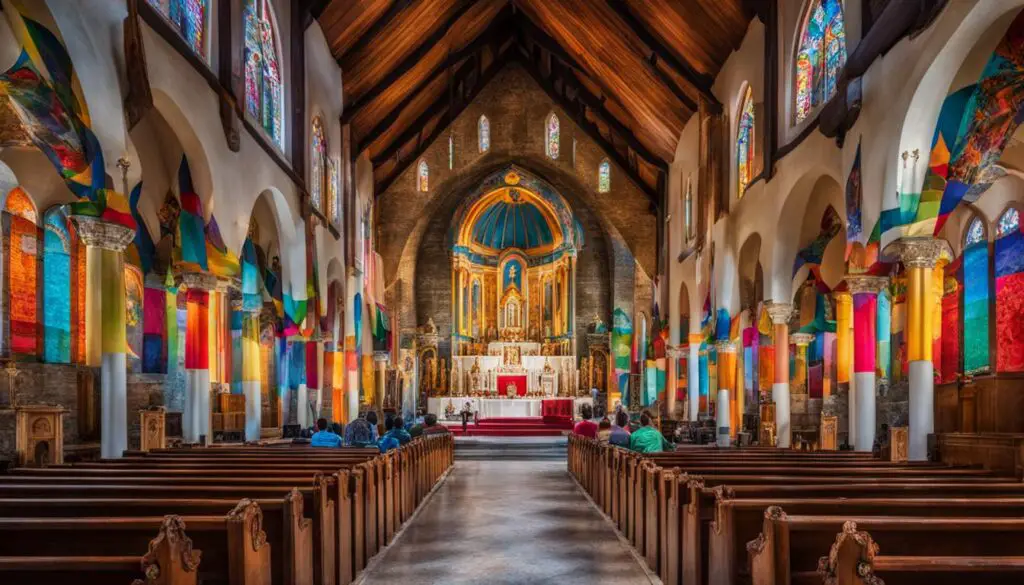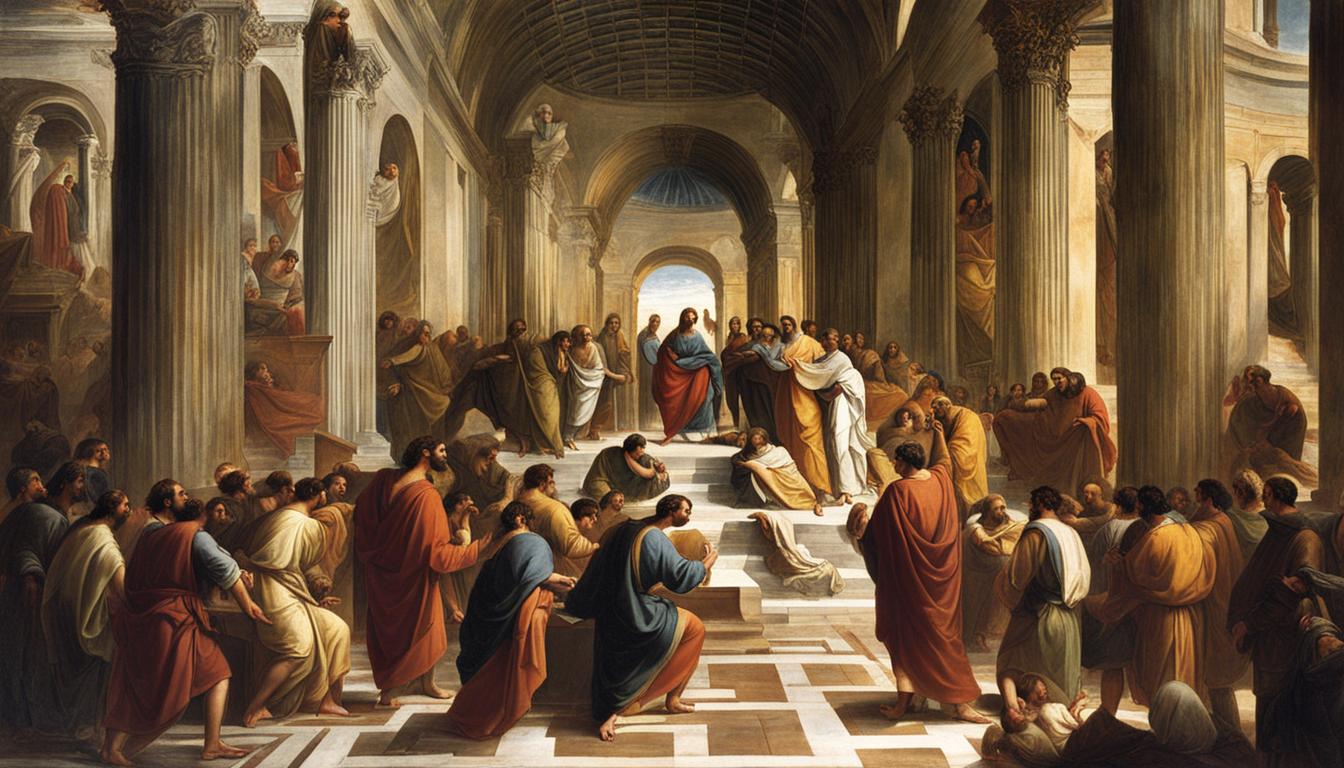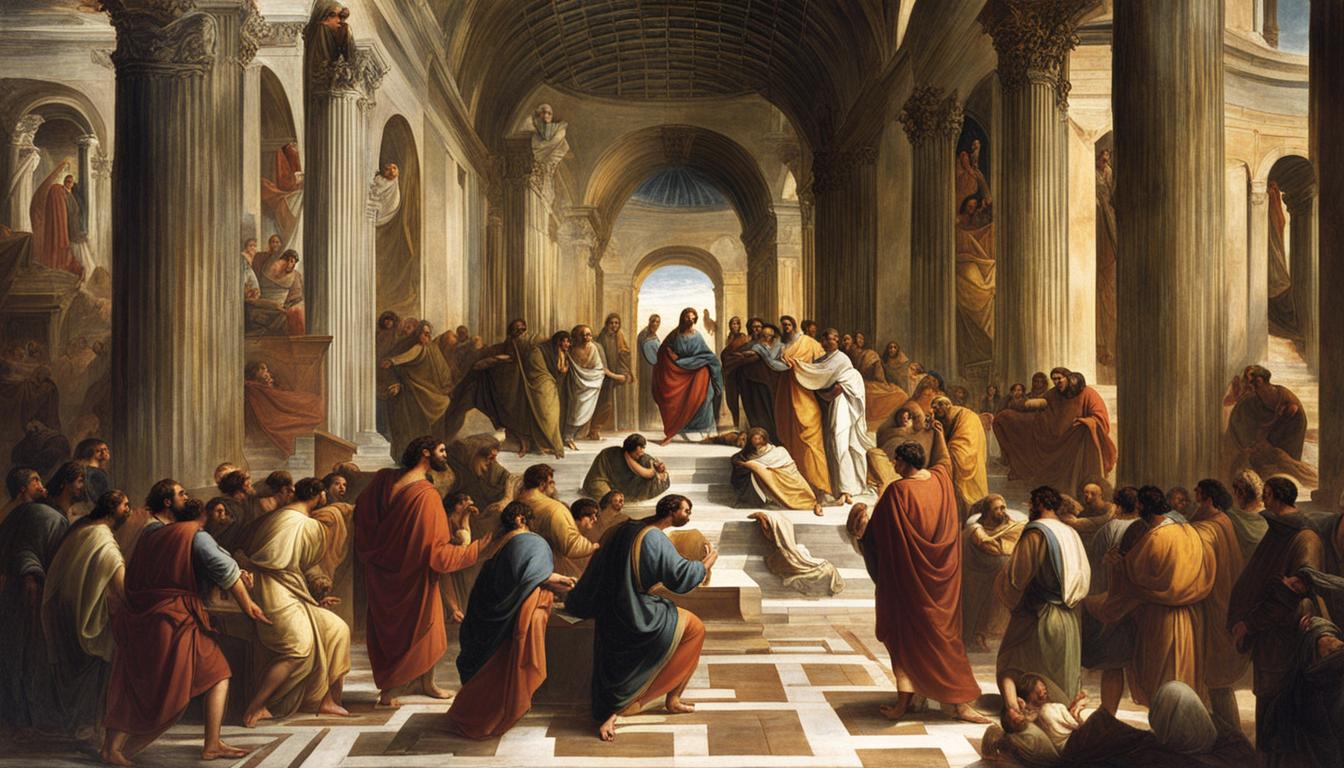The church in Philippi is a vibrant Christian community that values faith, worship, and outreach. Nestled in the heart of Philippi, this faith-based organization offers a welcoming space for religious gatherings, worship services, and spiritual growth.
With a rich history dating back to its founding by the apostle Paul during his second missionary journey, the church in Philippi holds a significant place in the development of Christianity in Europe. Composed primarily of Gentile believers, the church cultivated a strong sense of community and inclusivity, with women playing a vital role in its formation and growth.
At the church in Philippi, worship services are filled with uplifting music, heartfelt prayers, and engaging sermons that focus on the core beliefs and doctrines of the Christian faith. The congregation gathers regularly to celebrate the life, death, and resurrection of Jesus Christ and to deepen their understanding of God’s love and grace.
But the church in Philippi is not just a place for worship. It is also a community that actively seeks to make a difference in the lives of others. Through various church events and community outreach programs, members reach out with kindness, compassion, and support to those in need. They strive to be a beacon of hope and a source of positivity in the Philippi area.
Whether you are a lifelong Christian or just beginning to explore your faith, the church in Philippi welcomes you with open arms. It is a place where you can find spiritual guidance, foster meaningful connections, and experience the transformative power of God’s love.
Join us at the church in Philippi and embark on a journey of faith, community, and spiritual growth. Discover the joy of worship, the power of fellowship, and the endless possibilities of serving others. Together, let us explore the wonders of faith and discover the true meaning of community.
Key Takeaways:
- The church in Philippi, founded by the apostle Paul, is a vibrant Christian community.
- With a rich history, the church holds a significant place in the development of European Christianity.
- Worship services at the church in Philippi are filled with uplifting music, heartfelt prayers, and engaging sermons.
- The church in Philippi actively engages in community outreach programs, striving to make a difference in the lives of others.
- Whether you are a lifelong Christian or new to the faith, the church in Philippi welcomes you to explore your faith and experience the transformative power of God’s love.
Origins and Founders of the Church in Philippi
The church in Philippi, an important religious community with a rich history, was founded by the apostle Paul during his second missionary journey in the early first century. Alongside his companions Silas, Timothy, and Luke, Paul established the church around AD 50 or 51. The initial converts of the church were primarily Gentiles, marking the beginning of a predominantly Gentile fellowship. However, the congregation also had a strong presence of women, such as Lydia, who played a vital role in its formation and growth.
Paul’s decision to establish the church in Philippi, a leading city in the region of Macedonia, was guided by his vision of spreading Christianity throughout Europe. The establishment of the church marked a significant milestone as the first Christian church on the European continent. The apostle’s influence, combined with the devotion and dedication of the early believers, laid the foundation for the growth and impact of the church in Philippi.
“The church in Philippi stands as a testament to the missionary efforts of the apostle Paul and the transformative power of the Christian faith.”
While Paul is credited as the primary founder of the church in Philippi, it is essential to recognize the collective efforts and contributions of the early believers in shaping its identity and mission. The church’s origins as a Gentile fellowship led by Paul set the stage for its unique character and its ability to reach out to the surrounding community.
Table: Key Founders of the Church in Philippi
| Founder | Role |
|---|---|
| Apostle Paul | Main founder and influential leader |
| Silas, Timothy, and Luke | Companions of Paul, instrumental in the establishment and growth of the church |
| Lydia and other women | Early converts and leaders who played a crucial role in the formation of the church |
Key Beliefs and Doctrines of the Church in Philippi
The church in Philippi, like other early Christian communities, held to the core beliefs and doctrines of the Christian faith. Their beliefs centered on the divinity of Jesus Christ, viewing him as the Son of God and the savior of humanity. They believed that Jesus’ death and resurrection served as the means of salvation, offering forgiveness of sins and the promise of eternal life.
The Philippi church also emphasized the power and presence of the Holy Spirit in the life of believers. They believed that the Holy Spirit was God’s active presence in the world, guiding, empowering, and transforming individuals. The teachings of the apostle Paul, who played a significant role in the establishment and growth of the Philippi church, shaped the beliefs and doctrines of the congregation.
Another important aspect of the church’s beliefs was the centrality of faith in following Christ. They believed that salvation and righteousness came through faith in Jesus Christ, rather than through adherence to religious laws or rituals. This emphasis on faith as the key to salvation reflected the teachings of the apostle Paul, who wrote extensively on the topic and emphasized the importance of a personal relationship with Christ.
“For by grace you have been saved through faith. And this is not your own doing; it is the gift of God, not a result of works, so that no one may boast.” – Ephesians 2:8-9
The key beliefs and doctrines of the church in Philippi shaped their understanding of God, Jesus Christ, the Holy Spirit, salvation, and the Christian life. These beliefs formed the foundation of their faith and guided their worship practices, community outreach, and spiritual growth.
Theological Focus
While the church in Philippi held to the core beliefs of early Christianity, they also had a particular emphasis on unity, humility, and selflessness. The apostle Paul, in his letter to the Philippians, encouraged the believers to have the same mind and to consider others as more important than themselves (Philippians 2:2-4).
This teaching fostered a sense of community and encouraged the members of the Philippi church to serve one another and their surrounding community. Their commitment to love, service, and compassion had a significant impact on the church’s contemporary influence and continues to inspire Christian communities today.
| Key Beliefs and Doctrines | Scripture References |
|---|---|
| Divinity of Jesus Christ | John 1:1-14, Colossians 1:15-20 |
| Salvation through Jesus’ death and resurrection | 1 Corinthians 15:3-4, Romans 6:5-11 |
| Power and presence of the Holy Spirit | Acts 2:1-4, 1 Corinthians 12:4-11 |
| Importance of faith in following Christ | Ephesians 2:8-9, Galatians 2:16 |
Historical Significance of the Church in Philippi
The church in Philippi holds a significant place in the history of Christianity due to its historical significance as the first Christian church in Europe. Founded by the apostle Paul during his second missionary journey, the establishment of the church marked the beginning of the spread of Christianity throughout the continent. This early Christian community played a crucial role in the development and growth of European Christianity.
As the first Christian church in Europe, the church in Philippi served as a model for other Christian communities that would later be established. Its strong foundation and adherence to the teachings of the apostle Paul set a precedent for the faith and commitment of European believers. The church’s influence extended beyond its immediate region, inspiring and guiding believers throughout Europe.
The impact of the church in Philippi can still be seen today in the continued presence of Christianity in the region and the legacy of its teachings and example. Its emphasis on faith, unity, and community continues to inspire Christian communities worldwide, fostering a spirit of love, service, and compassion.
The Spread of European Christianity
The founding of the church in Philippi marked a significant turning point in the history of Christianity, as it paved the way for the spread of the faith throughout Europe. The presence of the church in Philippi attracted believers from various backgrounds and played a vital role in the establishment of other Christian communities in the region. The teachings and experiences of the early Christian believers in Philippi were shared with others, leading to the growth and expansion of European Christianity.
| Key Points | Impact |
|---|---|
| First Christian church in Europe | Marked the beginning of the spread of Christianity throughout the continent |
| Model for other Christian communities | Inspired and guided believers throughout Europe |
| Continued presence of Christianity in the region | Legacy of teachings and example continue to inspire Christian communities worldwide |
Image source: click here
Leadership and Governance of the Church in Philippi
The church in Philippi was led by a combination of apostolic leadership from figures like the apostle Paul and local leaders who emerged within the congregation. The apostle Paul maintained a strong connection with the church, even during his imprisonment, and provided guidance and teaching through his letters. The local leaders of the Philippi church played an important role in overseeing the day-to-day operations and spiritual guidance of the congregation.
The apostolic leadership of the church in Philippi, particularly that of the apostle Paul, was integral to its formation and growth. Paul’s deep commitment to the church and his personal investment in its members provided a strong foundation for the community. Through his letters, such as the Epistle to the Philippians, he provided guidance on matters of faith, unity, and conduct. His ongoing relationship with the church demonstrated his commitment to their spiritual well-being.
“I thank my God every time I remember you. In all my prayers for all of you, I always pray with joy because of your partnership in the gospel from the first day until now.” – Apostle Paul
In addition to apostolic leadership, the church in Philippi also had local leaders who emerged to provide guidance and support. These leaders, both men and women, played a vital role in overseeing the day-to-day operations of the church and ensuring the spiritual growth of its members. Their leadership helped to foster a sense of community and unity among the believers in Philippi.
The Role of Deacons in the Church
One specific role within the leadership structure of the church in Philippi was that of deacons. The office of deacon, derived from the Greek word “diakonos,” meaning servant, was responsible for various tasks within the church, including caring for the practical and physical needs of the congregation. This role allowed the deacons to support and serve the church community, enabling the apostles and other leaders to focus on teaching and spiritual guidance.
Church Governance
The governance of the church in Philippi likely followed a community-based model, where decisions were made collectively and guided by the principles of the Christian faith. The apostolic leadership, along with the local leaders and deacons, would have played important roles in the decision-making process, ensuring that the church operated in accordance with biblical teachings and the needs of the congregation. This shared governance structure helped to promote unity, involvement, and accountability within the church community.
| Church Leadership | Church Governance |
|---|---|
| Apostolic Leadership (e.g., Apostle Paul) | Collective Decision-Making |
| Local Leaders | Guided by Biblical Teachings |
| Deacons | Promoting Unity and Community Involvement |
Worship Practices at the Church in Philippi
The church in Philippi had a diverse range of worship practices that blended both Jewish and Gentile traditions. The congregation would regularly gather for worship services, which included various elements to foster spiritual growth and community bonding.
In these services, the Philippi church engaged in heartfelt prayers, expressing their devotion and seeking divine guidance. They also sang hymns, using music as a medium to worship and connect with God. The church valued the Scriptures and incorporated readings and teachings from the Bible to deepen their understanding of faith.
Another integral aspect of their worship was the participation in the Lord’s Supper, also known as communion or the Eucharist. This symbolic act served as a reminder of Jesus’ sacrifice and the shared bond within the community of believers.
The worship practices at the church in Philippi exemplified their commitment to spiritual growth, communal worship, and the teachings of Jesus. It created a space for believers to draw closer to God and to one another.
The worship gatherings within the church not only focused on spiritual rituals but also provided a platform for fellowship and mutual support among the members. This enabled them to share their spiritual gifts, provide guidance, and strengthen the bonds of their community.
| Worship Practices | Description |
|---|---|
| Prayers | Expressive prayers to seek divine guidance and show devotion. |
| Singing of Hymns | Using music as a means of worship and connecting with God. |
| Reading and Teaching from the Scriptures | Incorporating readings and teachings from the Bible. |
| Participation in the Lord’s Supper | A symbolic act to remember Jesus’ sacrifice and strengthen community bonds. |
The worship practices at the church in Philippi not only contributed to their spiritual growth but also played a significant role in fostering unity and love among the believers. These practices continue to inspire Christian worship and provide a foundation for religious rituals today.
Contemporary Influence of the Church in Philippi
The church in Philippi, with its rich history and strong sense of faith and community, continues to exert a significant contemporary influence. While it may be challenging to pinpoint specific details of its impact, the church’s legacy can be seen in the continued presence of Christianity in the region and the enduring influence of its teachings and example. The Philippi church’s emphasis on faith, unity, and community continues to inspire and guide Christian communities today, fostering a spirit of love, service, and compassion.
“By this everyone will know that you are my disciples if you love one another.” – John 13:35
The impact of the church extends beyond the boundaries of its physical location. The Philippi church’s historical significance as the first Christian church in Europe and its role in the spread of Christianity throughout the continent have left an indelible mark on the development of European Christianity. Its founding by the apostle Paul and the dedication of its members to the teachings of Christ have shaped the trajectory of the Christian faith as a whole.
Today, the influence of the church in Philippi can be seen in Christian communities that prioritize faith, unity, and community involvement. Its example serves as a source of encouragement and motivation for believers to come together, support one another, and make a positive impact in their local communities. The Philippi church’s commitment to spiritual growth and its emphasis on reaching out to others continue to inspire Christians to live out their faith in practical ways.
| Contemporary Impact | Examples |
|---|---|
| The church in Philippi has influenced the establishment of Christian communities throughout Europe and the world. | Churches in various countries with roots in the Philippi church’s teachings and practices. |
| The emphasis on faith, unity, and community has led to the formation of organizations and initiatives focused on serving others. | Faith-based organizations, community outreach programs, and humanitarian initiatives. |
| The church’s commitment to spiritual growth has inspired individuals to deepen their faith and seek a closer relationship with God. | Individuals engaging in personal Bible study, prayer, and active involvement in church activities. |
As the church in Philippi continues to make a lasting impact, its influence extends beyond its historical significance. The teachings and example of the Philippi church continue to shape and transform lives, fostering a vibrant and compassionate Christian community.
Current World Membership Number and Percentage of World Religions of the Church in Philippi
The church in Philippi, as an ancient Christian community, does not have a current world membership number or a percentage of world religions. However, its historical significance and the ongoing influence of its teachings make it a meaningful part of the global Christian community and an important chapter in the history of Christianity.

The church in Philippi holds a unique place in the development of Christianity, being the first Christian church in Europe. Its origins, beliefs, and practices have helped shape the faith and continue to inspire believers today. While it may not have specific membership statistics, its impact can be seen in the spread of Christianity throughout the region and the ongoing presence of Christian communities.
As a faith-based organization, the church in Philippi focuses on nurturing spiritual growth and fostering a sense of community among its members. Through worship services, outreach programs, and other activities, the church encourages individuals to deepen their faith and live out their beliefs in their daily lives. While its membership numbers may not be available, the church’s influence extends far beyond numerical counts, touching the lives of countless individuals who have been impacted by its teachings and example.
In conclusion, while we may not have precise figures for the current world membership number or percentage of world religions for the church in Philippi, its historical significance, impact, and ongoing influence are undeniable. The church in Philippi continues to be a symbol of faith, community, and spiritual growth, inspiring believers around the world to live out their Christian convictions.
Conclusion
The church in Philippi, founded by the apostle Paul, holds a significant place in the history of Christianity. As the first Christian church in Europe, it played a crucial role in the spread of Christianity throughout the continent. With its strong sense of faith and community, the Philippi church continues to inspire and guide believers today.
The key beliefs and doctrines of the church in Philippi align with the core teachings of the Christian faith. They emphasize the divinity of Jesus Christ, his death and resurrection for salvation, the power of the Holy Spirit, and the importance of faith in following Christ. The teachings of the apostle Paul and other leaders in the early church shaped the foundation of the Philippi church’s beliefs.
The historical significance of the church in Philippi cannot be overstated. Its establishment marked a pivotal moment in the spread of Christianity in Europe and served as a model for other early Christian communities. The church’s origins, its impact on European Christianity, and its presence in the rich tapestry of the Christian faith make it a cherished part of religious history.
The church in Philippi, like many other churches throughout history, has experienced denominational splits and schisms over the centuries. These divisions have been the result of theological differences, disagreements over church governance, and cultural and societal changes. Despite these challenges, the Philippi church has continued to adapt and evolve while maintaining its core beliefs and worship practices.
The worship practices at the church in Philippi encompassed a blend of Jewish and Gentile traditions. Regular worship services included prayers, hymns, readings from the Scriptures, and the Lord’s Supper. These gatherings also provided an opportunity for fellowship, mutual support, and the utilization of spiritual gifts within the community.
The contemporary influence of the church in Philippi may be difficult to quantify, but its legacy can be seen in the continued presence of Christianity in the region and the impact of its teachings and example. The church’s emphasis on faith, unity, and community continues to inspire and guide Christian communities today, fostering a spirit of love, service, and compassion.
While the church in Philippi does not have a current world membership number or a percentage of world religions, its historical significance and ongoing influence make it a meaningful part of the global Christian community. The Philippi church remains an important chapter in the history of Christianity, serving as a testament to the enduring power of faith and community.
FAQ
What is the historical significance of the Church in Philippi?
The church in Philippi is the first Christian church in Europe, marking the beginning of the spread of Christianity throughout the continent and playing a crucial role in the development of European Christianity.
Who founded the Church in Philippi?
The church in Philippi was founded by the apostle Paul, along with his companions Silas, Timothy, and Luke during Paul’s second missionary journey.
What were the key beliefs and doctrines of the Church in Philippi?
The church in Philippi held to the core beliefs and doctrines of the Christian faith, including the divinity of Jesus Christ, his death and resurrection as the means of salvation, the power of the Holy Spirit, and the importance of faith in following Christ.
How was the Church in Philippi led?
The church in Philippi was led by a combination of apostolic leadership from figures like the apostle Paul and local leaders who emerged within the congregation.
What were the worship practices at the Church in Philippi?
The worship practices at the church in Philippi would have been influenced by both Jewish and Gentile traditions. The congregation likely gathered for regular worship services, which included prayers, singing of hymns, reading and teaching from the Scriptures, and participation in the Lord’s Supper.
What is the contemporary influence of the Church in Philippi?
While the specific contemporary influence of the church in Philippi may be difficult to determine, its legacy can be seen in the continued presence of Christianity in the region and the impact of its teachings and example on Christian communities today.
What is the current world membership number and percentage of world religions of the Church in Philippi?
As an ancient Christian community, the church in Philippi does not have a current world membership number or a percentage of world religions. However, its historical significance and ongoing influence make it a meaningful part of the global Christian community.
















